educator, you can invite students
Now I'm an annotation
educator, you can invite students
Now I'm an annotation
discussion of the text
Hi everyone!
The Almighty hath inplanted in us these unextinguishable feelings for good and wise purposes. They are the guardians of his image in our, hearts.
For more on how dissenting Protestant Christianity blended with Enlightenment rationality informed Paine's writing, see the essay "To Begin the World Over Again”: Common Sense and the English Radical Tradition, by Anthony DiLorenzo.
Every spot of the old world is overrun with oppression. Freedom hath been hunted round the globe. Asia and Africa, have long ex- pelled her—Europe regards her like a stranger, and England hath given her warning to depart.
Learn more about the context of England's retaliation against oppression in Anthony DiLorenzo's essay, “To Begin the World Over Again”: Common Sense and the English Radical Tradition.
For as in Adam all sinned, and as in the first electors all men obeyed; as in the one all mankind were subjected to Satan, and in the other to sovereignty; as our innocence was lost in the first, and our autho-rity in the last; and as both disable us from re-assuming some former state and privilege, it unanswerably follows, that original sin and hereditary succession are parallels.
Learn more about this passage in Anthony DiLorenzo's essay, “To Begin the World Over Again”: Common Sense and the English Radical Tradition.
Norman yoke
The "Norman yoke" was a term English nationalists in the middle of the 17th century used to describe oppressive elements of feudalism introduced by William the Conqueror.
worm, who in the midst of his splendour is crumb-ing into dust
Find out more about what Paine means here and how he framed independence in cosmological terms in Anthony DiLorenzo's essay, "To Begin the World Over Again”: Common Sense and the English Radical Tradition"
Captain Death
Captain William Death was a British privateer. He commanded the Terrible, and died in battle in 1756, in the first year of the Seven Year's War. Thomas Paine, as a young man, almost sailed with Captain Death, but his father stopped him from going at the last minute.
Captain Death is not to be confused with the 1935 film Captain Blood, starring Errol Flynn and Olivia de Havilland.
wise and able men
Paine's vision for a new government presumes the participation of white men, not women, African Americans, or Native Americans.
But if you have, and still can shake hands with the murderers, then are you unworthy the name of husband, father, friend, or lover, and whatever may be your rank or title in life, you have the heart of a coward, and the spirit of a sycophant.
Paine is appealing here to his reader's sense of independence and manhood. What might this indicate about eighteenth-century ideas about gender roles?
and have no other preliminaries to settle with the reader, than that he will divest himself of prejudice and prepossession, and suffer his reason and his feelings to determine for themselves ; that he will put on, or rather that he will not put off the true character of a man, and generously enlarge his views beyond the present day.
Paine assumes here that his reader is male, and associates an openness of thought with being "manly."
man
Paine is using "man" to refer to all of humanity. It is important to remember, however, that women were excluded from formal participation in politics as citizens. They could not vote. Neither could most African-Americans and Native Americans.
Paine is using "man" to refer to all of humanity. It is important to remember, however, that women were excluded from formal participation in politics as citizens. They could not vote. Neither could most African-Americans and Native Americans.
PHILADELPHIA, PRINTED;
The first edition, printed in Philadelphia by Robert Bell, listed the author as "An Englishman." Paine had struggled to find a printer who would be willing to print Common Sense because of its incendiary content, and refused to put his name on the first edition for similar reasons. Later editions, however, bore his name.
seditious
Sedition: conduct or speech inciting people to rebel against the authority of a state or monarch.
libel
Libel: a published false statement that is damaging to a person's reputation; a written defamation.
Burlington-House
Burlington House originally began as a private residence on Picadilly Street, London, in 1664. In 1704, it became the home of Richard Boyle, Third Earl of Burlington, who became a famous architect in the Palladian style. Burlington died in 1753 and passed his home on to his son, Lord George Cavendish. Either he or the Third Duke of Portland occupied the home when John Almon worked across the street.
This is the facade of Burlington House as it still stands today. The courtyard is open to the public, and many of the wings contain exhibition galleries from the Royal Academy.

General Advertizer
The General Advertiser was an eighteenth-century newspaper. It was originally known as the London Daily Post and General Advertiser, and then became the General Advertiser. Printer Henry Woodfall took over the paper in 1713, renaming it the Public Advertiser. He operated it until his nineteen-year-old son, Henry Sampson Woodfall, took over the paper in 1769. relaunched as the Public Advertiser with much more news content. In 1758, the printer's nineteen-year-old son, Henry Sampson Woodfall took it over. During this time, The anonymous polemicist Junius sent his letters to the Public Advertiser. Henry Sampson Woodfall sold his interest in the Public Advertiser in November 1793. N. Byrne took it over and printed it as the Political and Literary Diary, but it went out of business by 1795.
Edmund Burke
Edmund Burke was a British statesman, political thinker, and Parliamentary orator who was active in the major political issues occurring in Britain in 1785. He was part of the controversy between King George III and Parliament, who, he believed, were attempting to exert too much control over the executive. He argued that though the king's actions did not legally defy the constitution, they went against the constitution in spirit. Similarly, during the American imperial crisis, Burke argued that the British government's treatment of the colonies followed the letter of the law, but lacked consistency and respect for the colonies' claims.
As a Whig Parliamentarian, Burke supported Americans grievances against Great Britain, especially in the area of taxation. However, he criticized the French Revolution for being destructive to society.

John Wilkes
John Wilkes became a Member of Parliament in 1757, where he advocated for the right of voters, rather than the House of Commons, in choosing their representatives, and began pushing for parliamentary reform in 1776. In 1771, Wilkes, in support of Almon, convinced the government to allow printers the right to publish verbatim accounts of parliamentary debates. He further supported the Patriot cause during the American Revolutionary War, making him more popular among Whigs.
William De Grey
William de Grey served as Attorney General under William Pitt the Elder from 1766-1771. In 1770, he took part in the trial of Henry Sampson Woodfall for printing and publishing the Letters of Junius, which he claimed contained seditious libel. Woodfall went free on the declaration of a mistrial. John Miller, printer of the London Evening Post was declared not guilty. Only bookseller John Almon was declared guilty, though he appears not to have been punished.
King George II
King George II died on October 25, 1760, and was succeeded by his grandson, George III. During his reign, George II's reign oversaw the War of Austrian Succession and the Seven Years' War. As Secretary of State, William Pitt the Elder directed the policy of the Seven Years' War.

John Montagu, 4th Earl of Sandwich
At the time of Almon's publication against him in 1773, John Montagu, the 4th Earl of Sandwich, was the First Lord of the Admiralty of Great Britain. Many have traditionally claimed that he was incompetent in this role during the buildup to the American Revolution.
As Secretary of State for the Northern Department in August 1763, Montagu succeeded at trying his former friend, John Wilkes, for obscene libel. As a result, Wilkes' opposition supporters labeled Montagu as a betrayer.
More popularly today, Montagu is attributed to be the inventor of the sandwich.

Annotations highlighted in red are contributed by the site creators.
Welcome to Explore Common Sense! Click on the red highlights throughout the website to view commentary from the site developers. Create your own account using the "sign up" link above to add your own public or private highlights, notes, and comments.
enslaved
Enslavement here does not refer to physical bondage, but is a rhetorical tool used to describe political oppression.
several
The American edition specifies six million people, the population of the 13 American colonies at the time of the Revolution. It is unclear why Almon made this change.
Saltpetre
Saltpetre is another name for potassium nitrate, one of the major ingredients in gunpowder.
Ass for a Lion.
The Ass in the Lion's Skin is one of Aesop's Fables. In the fable, a donkey puts on a lion's skin and uses it to scare his fellow animals until the Fox sees through his deception because of the sound of his voice. The moral of this fable cautions against presumption and trusting appearances.
 The Ass in the Lion's Skin (Illustration by Arthur Rackham, 1912)
The Ass in the Lion's Skin (Illustration by Arthur Rackham, 1912)
Popish
Popish is a (slightly derogatory) term for Catholics. Most Protestants believed that Catholicism was overly ritualistic to the point of idolatry and that the Pope was no better than a despot. To be under "Popish" rule was the worst fear of many Englishmen.
Behold thou art old, and thy sons walk not in thy ways, now make us a king to judge us, like all the other nations.
This passage is from 1 Samuel 8:1-22.
Rule thou over us, thou and thy son and thy son's son.
This and the following quote are from Judges 8:22-23.
the fate of Charles the First
Charles I was King of England from 1625 to 1649. He was perceived to be an absolute monarch, and fought against Oliver Cromwell's armies during the English Civil War from 1642 until he was captured and executed in 1649.
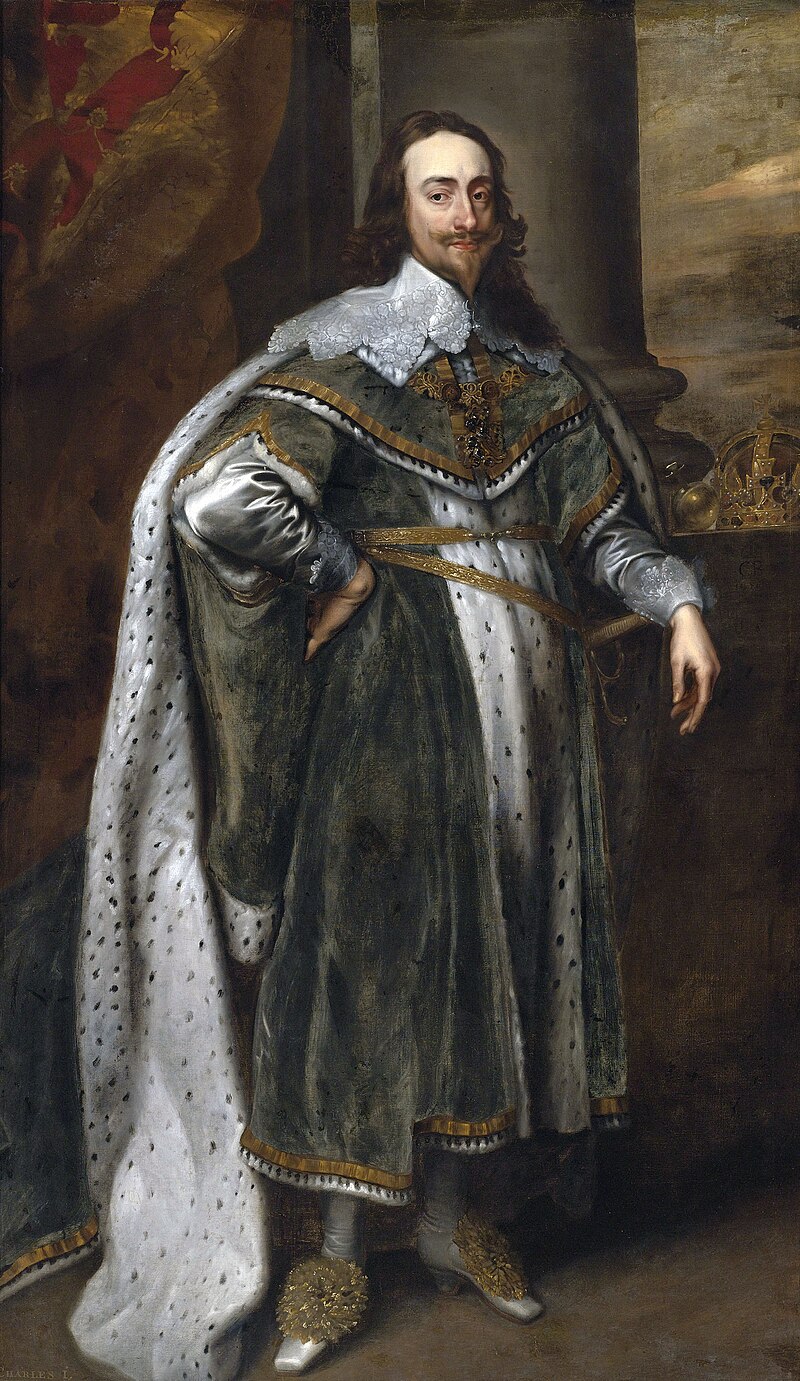 Charles I
Charles I
felo de se
Felo de se is the archaic, legal Latin term for suicide. Literally, it means "makes a felon of him/herself".
an housedivided against itself
This is an allusion to Mark 3:25, famously used in an 1858 speech by a young senatorial candidate from Illinois, Abraham Lincoln.<br>
 Lincoln in 1858
Lincoln in 1858
The state of a king shuts him fromthe world
Eighteenth-century monarchs lived in palaces, surrounded by nobles and courtiers, rarely interacting with common people.  The State Apartments at Windsor Castle
The State Apartments at Windsor Castle
Burgh’s poli-tical Disquisitions.
James Burgh's Political Disquisitions was an early case for freedom of speech and universal suffrage.
constitution ofEngland
The English constitution is not one written document, but rather a series of laws, practices and agreements. Paine is most likely referring to the 1689 Bill of Rights, which established the supremacy of Parliament over the monarch during the Glorious Revolution, which deposed King James II and put in his place his daughter Mary and her husband, William of Orange. For more on the British constitution, check out this article from the British Library.
 The Bill of Rights being presented to William and Mary
The Bill of Rights being presented to William and Mary
over-run with tyranny
In 1689, at the time of the Glorious Revolution, most other monarchs, particularly Louis XIV in France, ruled as absolute monarchs.  Louis XIV, 1701
Louis XIV, 1701
Mr. Burchett
Josiah Burchett was Secretary of the Admiralty (essentially, chief administrative officer of the British Navy) for nearly fifty years, from 1695 to 1742. 
Entic's naval history
A new naval history, or, Compleat view of the British marine... by John Entick was published in London in 1757.
Our land force is already sufficient, and as to naval affairs, we cannot be insensible, that Britain would never suffer an Ame- rican man of war to be built, while the continent remained in her hands.
Paine's assessment of America's military capabilities is rather optimistic.
Massanello
Masaniello (an abbreviation of Tomasso Aniello) led a revolt against Spain in 1647. Born and raised in Naples, Masaniello was a fisherman and fishmonger. In the 1640s, Spain, which ruled Naples, imposed a series of heavy taxes in order to help fund its wars elsewhere. The Neapolitans revolted on July 7, 1647, and Masaniello, a well-known man, attempted to discipline the mob. Eventually, he became the rebel leader, negotiated terms with the Spanish, and became "captain-general of the Neapolitan people." However, he began to act erratically, and by July 17, 1647, he had been assassinated. 
which hath stirred up the In- dians and Negroes to destroy us
The charge that the British Crown had induced Native Americans to attack colonists was later repeated in the Declaration of Independence.
qualified voters
"Qualified voters" meant almost exclusively white men. As the former colonies began the process of writing state constitutions, debates over who should be included as a "qualified voter" often divided conventions. Vermont and Pennsylvania had two of the most liberal constitutions. Vermont permitted all men, regardless of color, to vote, while Pennsylvania permitted all white men to vote regardless of income. Other states, like Maryland, had much more restrictive qualifications for voting and required that free white men also hold property. 
like the Royal Brute of Great Britain.
Find out why this line was blocked out in the interpretive essay, "Holes in the Cloth: What Got Left Out of the British Edition of Common Sense?"
Dragonetti
Giacinto Dragonetti was an Italian jurist and political thinker. His 1766 pamphlet "Virtues and Prizes" was widely published across Europe. 
Small islands
Here, Paine is referring to Britain's Caribbean colonies.
Every quiet method for peace hath been ineffectual
The Second Continental Congress adopted the Olive Branch Petition on July 5, 1775, in an attempt to avoid full-scale war, even though armed hostilities had already commenced at Lexington and Concord nearly three months prior. However, the next day the Congress issued the "Declaration of the Causes and Necessity of Taking Up Arms," which explained the reasons for the armed conflict, and it was clear that no reconciliation was possible.
“ Never can true reconcile- ment grow, where wounds of deadly hate have pierc’d so deep.”
John Milton, Paradise Lost, Book 4, lines 98-99.
Milton's Paradise Lost, first published in 1667, is an epic poem in English on the Biblical story of Adam and Eve in the Garden of Eden and the fall of man. In this quote, part of Satan's internal monologue at the beginning of Book 4, Satan realizes that he could never reconcile with God and therefore can never escape Hell. Paradise Lost was popular and well-known to eighteenth century readers.
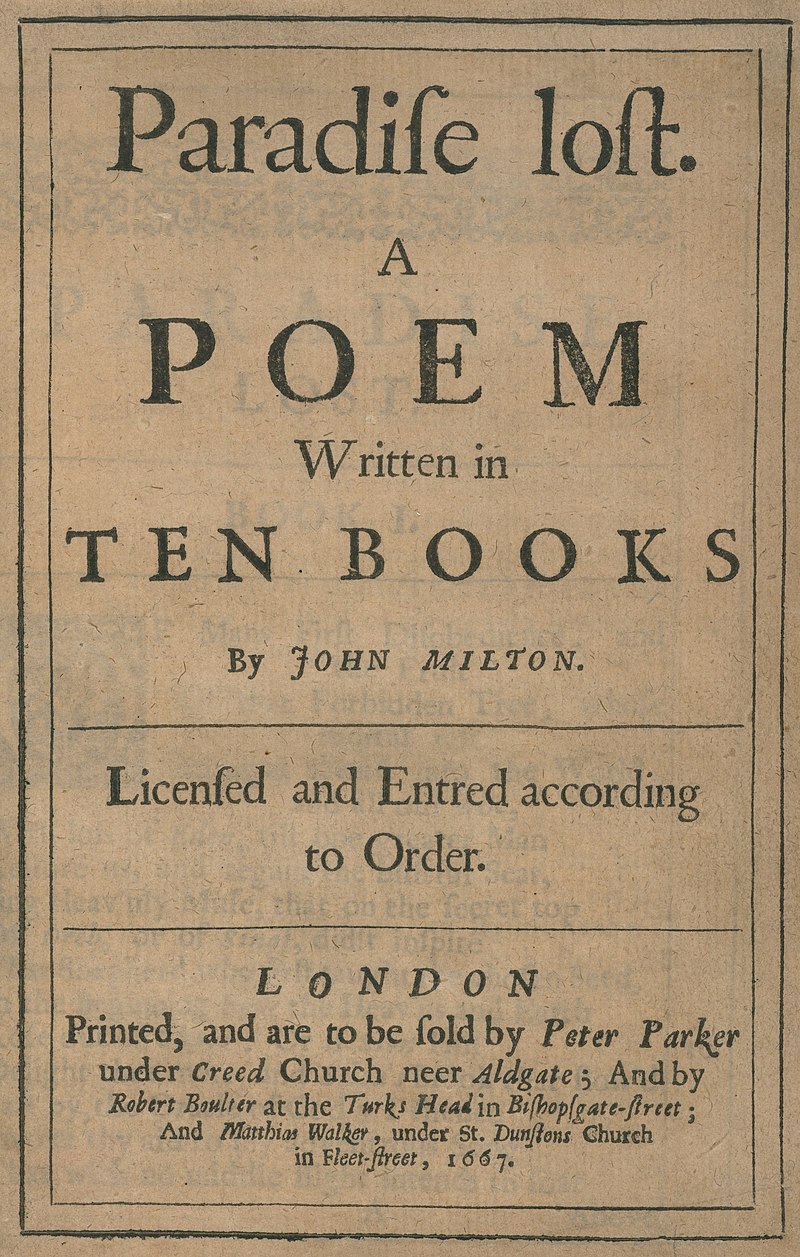
Even the distance at which the Almighty hath placed England and America
The distance from London to Philadelphia is 3,500 miles. In the eighteenth century, the transatlantic crossing could take anywhere from six weeks to three months. Communication between Britain and the American colonies could only travel as fast as a ship across the Atlantic.

and set us at variance with nations, who would otherwise seek our friendship, and against whom we have neither anger nor complaint.
This sentence was added by the British printer. It does not appear in the American edition. Why might Almon have added this? What does it do to the effect of the previous statement? Find out more in the essay, "Holes in the Cloth: What Got Left Out of the British Edition of Common Sense?"
Not one-third of the inhabitants, even of this province, are of English de- scent.
Pennsylvania had a high number of immigrants from Germany. The English colonies received many immigrants from other parts of Europe as well as the forced migration of enslaved people from Africa.
jesuitically
The Society of Jesus, called the Jesuits, an order of Catholic priests, was established in 1540 by Ignatius of Loyola. The Jesuits were renowned for being teachers and scholars. They also had a reputation for being wily and able to twist words and rules to their own ends. Hence, calling something "jesuitical" means that the logic or reasoning behind it is suspect.
en-grossed
"Engrossed" here means "kept exclusive possession of."
a continent—of at least one eighth part of the habit- able globe
The colonists believed they had a right to continued westward expansion, and were frustrated at Britain's attempts to slow westward expansion and protect Native American land.
the appeal was the choice of the king
The occupation of Boston, from October of 1768 until March 17, 1776, was the first aggressive act by the King in response to the unrest in the Colonies. The British hoped that by suppressing the Bostonians, they could quell the rebellion before it could get started.
nineteenth of April, i. e. to the commencement of hostilities
The Battles of Lexington and Concord, the beginning of the war, were April 18-19, 1775.
Mr. Pelham
Henry Pelham was a British politician, who served as Prime Minister of Great Britain from 1743 until his death in 1754. 
I rejected the hardened, sullen tempered Pharoah of England forever; and disdain the wretch, that with the pretended title of FATHER OF HIS PEOPLE canunfeelingly hear of their slaughter, and composedly sleep with their blood upon his soul.
What consequences might printer J. Almon have faced if he left this line in his publication? Find out in the essay, "Holes in the Cloth: What Got Left Out of the British Edition of Common Sense?"
that a youth of twenty-one
George III was 22 when he ascended to the throne in 1760.
Sir William Meredith
Sir William Meredith was a British politician, a member of the King's Privy Council.
The removal of N——,
Frederick North, 2nd Earl of Guilford, also known as Lord North, was Prime Minister of Great Britain from 1770-1782. He was the chief architect of the Intolerable Acts, or the Coercive Acts, which closed the port of the city of Boston in response to the Boston Tea Party in 1773. North's policies infuriated the colonists, who blamed him for the whole kerfuffle.
Learn about why Almon did not print North's full name in the essay, "Holes in the Cloth: What Got Left Out of the British Edition of Common Sense?"
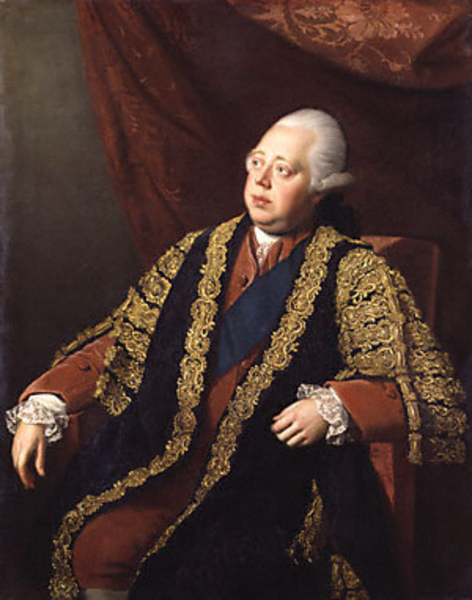
junto
Junto is another word for group or club; Paine refers here to North and the officials he appointed in the government.
not induced by motives of pride, party, or resent- ment to espouse the doctrine of separation and independance ; I am clearly, positively, and conscientiously persuaded
The model Enlightenment politician was "disinterested" in politics. Ideally, this meant he did not depend on trade or business for his income, meaning that any political decisions he made would be completely unaffected by personal interest. In practice, it meant that politicians and writers went to great lengths to proclaim their neutrality and the reasoned thinking that went into their decisions.
Henry the Seventh
Henry VII was the first Tudor monarch. He defeated Richard III, a York king, at the Battle of Bosworth Field, ending the Wars of the Roses. Henry VII's claim to the throne came from his great-great-grandfather, Edward III, and he strengthened that claim by marrying Catherine of York, daughter of Edward IV. He seized the throne in 1485 and ruled until his death in 1509, when he was succeeded by his son, Henry VIII.

Henry
Henry VI of England ascended to the throne in 1422 at the age of nine months. He was a descendant of John, Duke of Lancaster, one of the sons of Edward III, and fought against his cousin Edward VI for the throne in the Wars of the Roses. He died in 1471.

Edward
Edward IV was a descendant of Edmund, First Duke of York, one of the sons of Edward III and ruled England from 1461 until his death in 1483. He fought against his cousin Henry VI for control of the English throne in the Wars of the Roses.
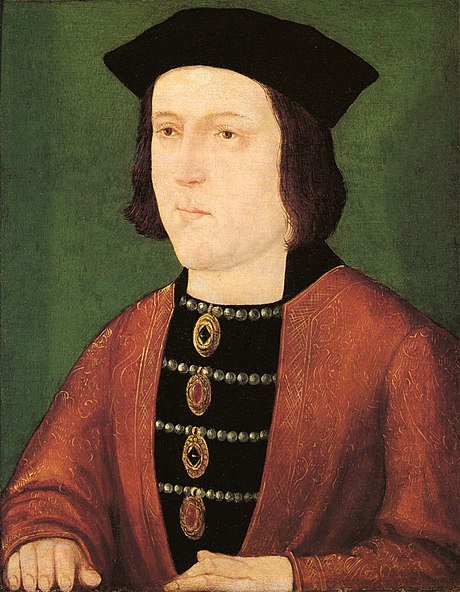
The contest for monarchy and succession, between the houses of York and Lancaster
Also known as the Wars of the Roses. The House of York was represented by a white rose, and the House of Lancaster by a red rose.


Thirty kings and two minors have reigned in that distracted kingdom since the conquest
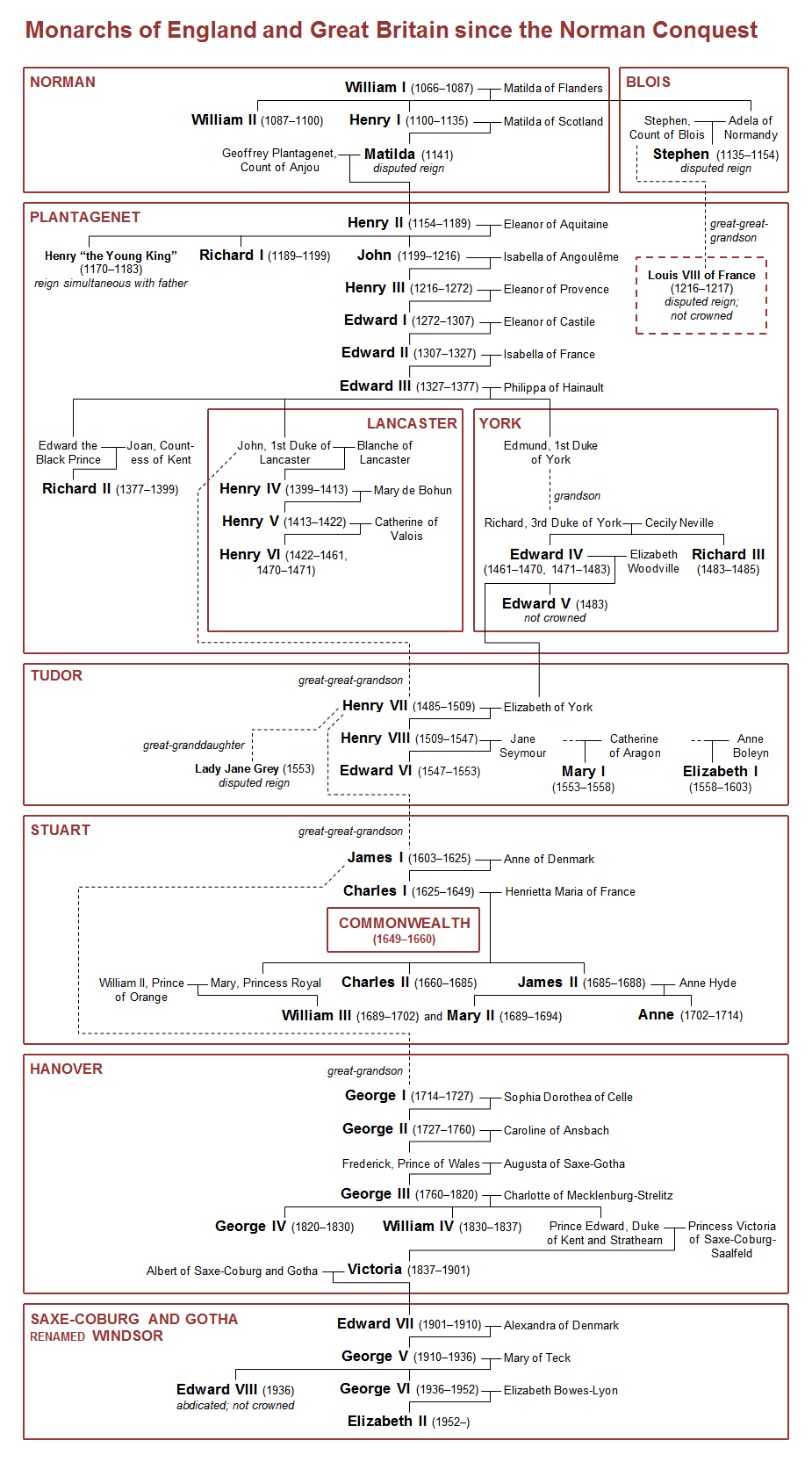
a king, worn out with age and infirmity, enters the last stage of hu- man weakness.
This would later happen to George III, who suffered from mental illness later in his life. In 1810, a regency was established, and his son George, Prince of Wales (later George IV), ruled in his stead.  George III in later life, engraving by Henry Meyer.
George III in later life, engraving by Henry Meyer.
throne is subject be possessed by a minor at any age
A minor can inherit the throne if they are the legitimate successor of the monarch. The English throne had been held by several minors, including Richard II, Edward V, Edward VI, and Lady Jane Grey. Having a minor on the throne meant the country was governed by a regent, and power struggles inevitably ensued.
 Richard II, who inherited the throne in 1377 at the age of 10.
Richard II, who inherited the throne in 1377 at the age of 10.
sophist
In ancient Greece and Rome, a sophist was a teacher of rhetoric and logic. Paine uses it here to refer to a learned person.
in Adam all sinned
The doctrine of original sin was originally developed by St. Augustine. As a part of Christian theology, it explains humanity's tendency towards sin as the direct result of Adam and Eve eating the forbidden fruit in the Garden of Eden.
 Adam and Eve, on the Sistine Chapel ceiling, by Michelangelo
Adam and Eve, on the Sistine Chapel ceiling, by Michelangelo
William the Conqueror
William the Conquerer became king of England in 1066 and ruled until his death in 1087. He was the bastard son of Robert, Duke of Normandy, and defeated Harold Godwinson at the Battle of Hastings in 1066 to take the throne of England.
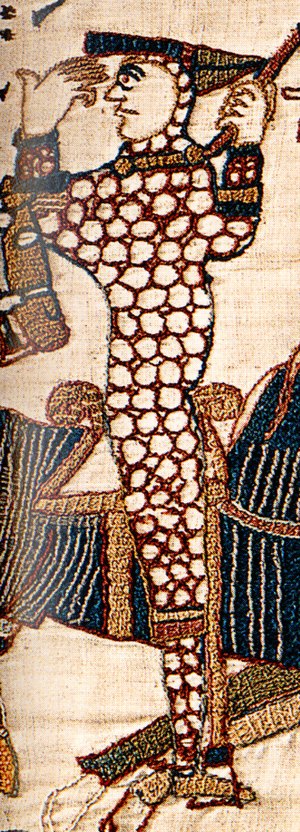 William the Conqueror, as depicted on the Bayeux Tapestry
William the Conqueror, as depicted on the Bayeux Tapestry
Mahomet like
"Mahomet" refers to the Prophet Muhammad. Europeans in the eighteenth century had a very negative view of Islam. This may refer to Voltaire's 1742 play Mahomet, a direct attack on the character of Muhammad, in which Mahomet is depicted as using his power, religious fanaticism, and the pretense of divine right to act as an absolute ruler. 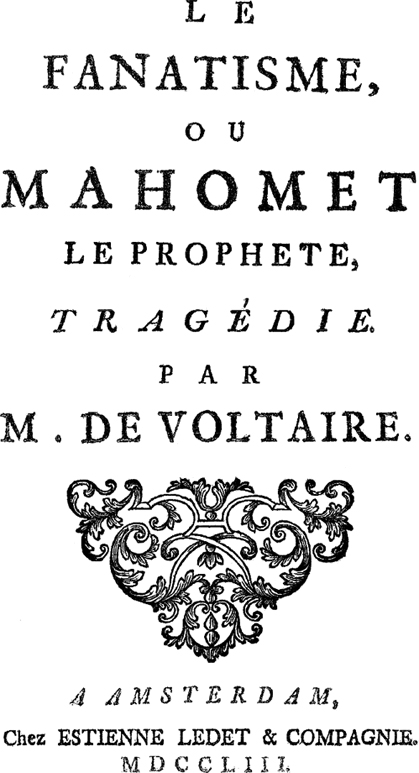
Heathens
Paine may be referring to the Egyptians or to other early Middle Eastern civilizations.
Render unto Caesar the things which art Caesar’s
Mark 12:13-17, Matthew 22:15-22, Luke 20:20-26. In this Bible story, inquisitors are trying to trap Jesus into making a rebellious statement against Roman rule by asking him if he opposes a tax the Jews owe to the Romans. Jesus replies by differentiating between the things owed to God and the things owed to earthly rulers (ie, taxes) and says that it's acceptable for the Jews to pay taxes to the Romans.
Holland without a king hathenjoyed more peace for this last century
The Dutch Republic was formed with the signing of the Union of Utrecht in 1579, when several provinces of the Low Countries (the present-day Netherlands) agreed to protect each other against the Spanish army, which had previously controlled them. They existed as a confederacy of seven independently governed provinces joined together by the States General, a federal government. In the 17th century, the Dutch Republic prospered as the Dutch East and West India Companies dominated world trade. The Dutch Republic ended in 1787 when the Netherlands were invaded by Prussia.  Dutch East India Company Ship, c. 1600
Dutch East India Company Ship, c. 1600
commons
The House of Commons is the lower house of the British Parliament. Members of the Commons were elected. Over the course of the eighteenth century, the House of Commons gained more and more power.
 Chamber of the House of Commons, Westminster Palace, London
Chamber of the House of Commons, Westminster Palace, London
peers
England had a class of nobles, also called peers, who owned vast tracts of land and inherited titles of nobility (Duke, Lord, etc.). The monarch can create new peers, and members of the peerage are entitled to seats in the House of Lords, the upper house of the British Parliament.
 The House of Lords
The House of Lords
king
The king of England at this time was George III, who ruled from 1760 until his death in 1820.
P. S. The Publication of this new edition hath beendelayed, with a view of taking notice (had it been neces-sary) of any attempt to refute the doctrine of independ-ance: As no answer hath yet appeared, it is now pre-sumed that none will, the time needful for getting - sucb aperformance ready for the public being considerably past. Who the author of this production is, is wholly unneces-sary to the public, as the object for attention is the Doctrineitself, not the Man. Yet it may not be unnecessary to sayThat he is unconnected with any party, and under no sortof influence public or private, but the influence of reasonand principle.
Thomas Paine added this post scriptum to his original introduction.
and fatal
Why do you think the publisher removed "fatal," but not "dangerous"?
usurpation
The printer redacted "usurpation" to avoid accusations of treason in calling the king or parliament usurpers--those who seized their office or power by force or without legal right.
combination,
Why is this word missing from the document? The British printer left out the word "combination" from the original text because he was trying to hide that Thomas Paine had blamed the combination of the king and parliament abusing their power as the cause of the people's oppression.
A NEW EDITION, with several Additions in the Body of theWork. To which is added an APPENDIX ; together with anAddress to the People called QUAKERS. N. B. The New Addition here given increases the Work upwardsof One-Third.
Not only did the British printer J. Almon remove portions of the text that may be found treasonous, but in several areas he inserted additional lines into the original text.
The appendix and the treatise on the Quakers are not included in this digital edition.
Boston
The British army occupied Boston from October of 1768 until March 17, 1776 (after the publication of Common Sense). British troops had arrived in response to public protests against the Townshend Acts, and remained in the city for eight years. The occupation created many hardships for both townspeople and soldiers, as supplies, particularly food, were often scarce.
 A British tactical map of Boston, 1775
A British tactical map of Boston, 1775
and
This large blank space appears in the first American edition of Common Sense as well.
Swisserland
The loose confederation of states that became modern Switzerland first formed at the end of the thirteenth century. In the eighteenth century, the confederacy was nominally a republic but was ruled by an oligarchic group of aristocrats.
Holland
The Republic of the Seven United Netherlands, or the Dutch Republic, was a confederation of seven provinces. This confederation lasted from 1581 to 1795. This period constituted what is often called the "Dutch Golden Age," when the Dutch ruled a maritime empire around the globe and was an influential economic power.
 Dutch East India Trading Company Ship, c. 1600
Dutch East India Trading Company Ship, c. 1600